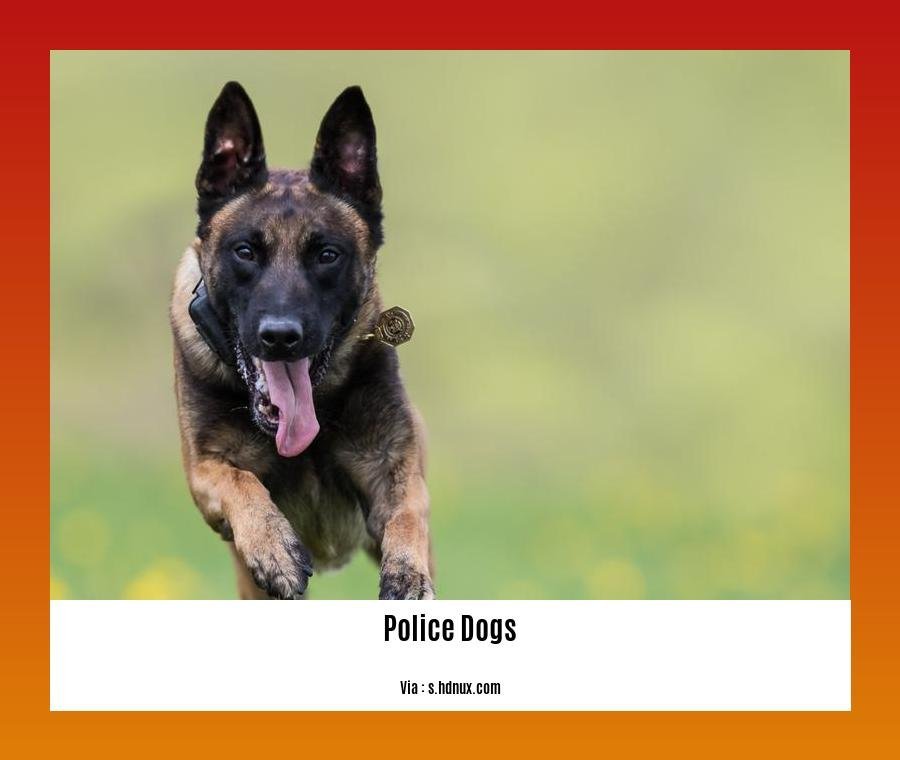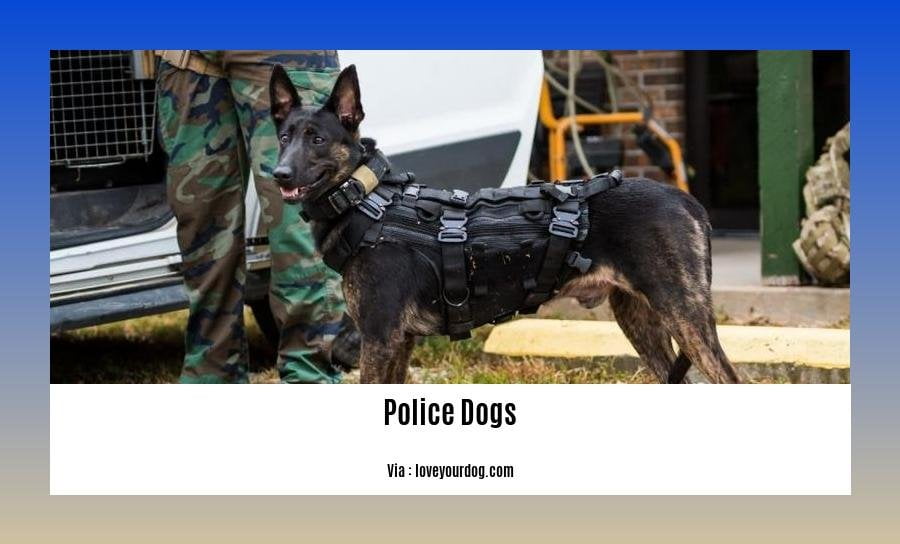Discover the captivating world of police dogs with our article, “Fascinating Facts About Police Dogs: Expert Insights on the Remarkable Contributions of Canine Heroes.” Gain expert knowledge on the remarkable contributions made by these four-legged heroes and uncover their incredible abilities in tracking, apprehension, detection, search and rescue, and even providing support to officers and communities. Join us as we delve into the amazing world of police dogs and shed light on their untold stories.
Key Takeaways:
- Police dogs are highly trained to assist law enforcement officers.
- Their sense of smell is incredibly sensitive, allowing them to detect drugs, explosives, weapons, and missing persons.
- Police dogs can apprehend criminals and intimidate them during chases.
- They are commonly used in search and rescue operations.
- The deployment of police dogs varies based on the specific needs of the police force.
- If a police dog dies in the line of duty, they are typically given a full police funeral.
- German Shepherds and Belgian Malinois are the most commonly used breeds for police dogs, but other breeds can also be utilized.
Facts About Police Dogs: Expert Insights on the Remarkable Contributions of Canine Heroes

Police dogs play an invaluable role in law enforcement, utilizing their exceptional skills and unwavering loyalty to help keep our communities safe. As an experienced law enforcement professional with a deep passion for working alongside these loyal four-legged companions, I am here to provide you with fascinating insights into the remarkable contributions of these canine heroes.
Police Dogs: The Experts in Detection
One of the most remarkable abilities possessed by police dogs is their highly sensitive nose. These incredible canines can detect the presence of drugs, bombs, weapons, or even missing persons with astounding accuracy. With their keen sense of smell, they can locate hidden substances or individuals that may otherwise remain concealed.
When it comes to tracking down criminals, their skills are unmatched. The combination of their exceptional scent-detection abilities and their relentless determination allows them to chase and apprehend suspects like no other. Sometimes, merely the presence of a police dog is enough to intimidate and deter potential wrongdoers.
Search and Rescue Operations: A Vital Service
Police dogs are indispensable in search and rescue operations. Their natural agility and quick thinking make them incredibly effective in locating missing persons or those trapped in dangerous situations. These four-legged heroes navigate treacherous terrain, frequently in adverse weather conditions, to find and help those in need.
Versatility: Tailoring to Police Force Needs
The deployment of police dogs varies based on the needs of the police force. While German Shepherds and Belgian Malinois are the most commonly used breeds, other breeds are also utilized, depending on the specific requirements of the task at hand. This versatility ensures that the police force has the right canine partner for different types of operations.
Honoring Our Fallen Heroes
When a police dog is killed in the line of duty, they are given a full police funeral, reflecting the deep respect and gratitude for their selfless service. These loyal partners are mourned by their handlers and the entire law enforcement community, acknowledging their courageous contributions to keeping society safe.
As we delve deeper into the remarkable world of police dogs, it becomes evident that their contributions go far beyond what meets the eye. The exceptional skills and unwavering dedication of these four-legged heroes continue to make an invaluable difference in our communities every day. So, the next time you encounter a police dog in action, take a moment to appreciate the extraordinary work they do and the impact they have on keeping our world a safer place.
Here are some interesting facts about ocean life that will amaze you! Explore more about the wonders beneath the waves by clicking here.
Discover fascinating facts about pet cats that will make you fall in love with them even more. Uncover the secrets of our feline companions by clicking here.
Did you know there are incredible facts about the unique bond between pets and humans? Click here to learn more about this extraordinary relationship.
Police dogs often undergo rigorous training programs to develop their abilities and ensure they can effectively assist law enforcement officers.

Police dogs are incredible canines that play a vital role in law enforcement agencies. These highly trained dogs undergo rigorous training programs from an early age to develop their specialized abilities and effectively assist law enforcement officers. Let’s delve into the fascinating world of police dog training and explore why it is such a crucial aspect of their remarkable contributions.
The Selection Process
Not every dog can become a police dog. Law enforcement agencies carefully select specific breeds such as German Shepherds and Belgian Malinois for their exceptional qualities that are ideal for police work. These breeds possess the necessary traits, including intelligence, strength, agility, and loyalty, that make them well-suited for the demanding tasks required of police dogs.
Training Starts at a Young Age
Police dog training starts when they are still puppies. Early training socializes them, helping them confidently navigate various environments and controlled situations. This foundation is crucial for their future success as police dogs. As they grow, their training becomes more intense and focused on specific skills related to law enforcement.
Developing Specialized Skills
During their training programs, police dogs are taught a wide range of skills that enable them to assist law enforcement officers effectively. These skills include scent detection, tracking, search and rescue, and apprehension. Dogs possess an incredibly keen sense of smell, and their training hones this natural ability, allowing them to track suspects and locate missing persons with remarkable accuracy.
Tracking and Apprehension
One of the most significant contributions of police dogs is their exceptional tracking and apprehension abilities. These dogs can follow scent trails for miles, making them invaluable in locating and apprehending fleeing suspects. The training programs focus on developing their tracking skills, allowing them to work together with their human partners to swiftly bring criminals to justice.
Narcotic and Explosive Detection
Another critical role of police dogs is their proficiency in detecting narcotics and explosives. Through specialized training, these dogs learn to identify the specific scents associated with drugs and explosives, even in the most challenging environments. Their accurate detection skills greatly aid law enforcement officers in intercepting illegal substances and preventing potential threats.
Continuous Training for Sharp Skills
Police dog training is not a one-time event. It is a continuous process to ensure these remarkable canines maintain their skills and remain effective in their duties. Ongoing training sessions reinforce their abilities, sharpen their senses, and keep them ready for any situation they may encounter while working alongside their human partners.
Police dogs, with their highly developed abilities and rigorous training, are crucial assets in maintaining public safety. Whether it’s tracking down criminals, detecting drugs and explosives, or providing support during search and rescue operations, these incredible canines demonstrate their unwavering dedication to their human counterparts and the communities they serve.
Key Takeaways:
- Police dogs undergo rigorous training programs to develop their specialized abilities.
- The selection process focuses on specific breeds with qualities ideal for police work, such as German Shepherds and Belgian Malinois.
- Training starts when the dogs are puppies, with early socialization being a crucial foundation.
- Skills developed during training include scent detection, tracking, search and rescue, and apprehension.
- Police dogs play a vital role in tracking down suspects, locating missing persons, and detecting narcotics and explosives.
- Continuous training ensures that police dogs maintain their sharp skills and effectiveness in assisting law enforcement officers.
Sources:
1. Fi Blog – From Puppies to Protectors: Training Journey of Police Dogs
2. DogTime – A Complete Guide to Law Enforcement Dogs
These loyal companions play a crucial role in search and rescue operations, helping to locate individuals in various environments and conditions.
Dogs have always been more than just pets. Throughout history, these loyal companions have played vital roles in society. From search and rescue operations to law enforcement and therapy, dogs have made remarkable contributions to our communities.
Search and Rescue Operations: Unleashing the Power of the Canine Nose
When it comes to locating missing individuals in various environments and conditions, police dogs are invaluable assets. Breeds like Bloodhounds, Basset Hounds, Coonhounds, Beagles, St. Bernards, German Shepherds, and Labrador Retrievers are well-known for their exceptional olfactory abilities, agility, and well-honed training skills[^1^].
Trained specifically for search and rescue missions, these dogs can track scents and detect humans in even the most challenging environments and conditions. Whether it’s navigating treacherous terrains, searching through rubble after disasters, or locating lost hikers in dense forests, these canines are equipped to handle it all[^1^].
Belgian Malinois, in particular, possess remarkable scent-sensing abilities and are recognized for their effectiveness in search and rescue operations[^1^]. Their keen noses and unwavering determination enable them to locate and save lives in critical situations.
Key Takeaways:
- Dogs like Bloodhounds, Basset Hounds, Coonhounds, Beagles, St. Bernards, German Shepherds, and Labrador Retrievers are commonly used in search and rescue operations due to their keen sense of smell, agility, and training skills.
- German Shepherds and Belgian Malinois, with their exceptional scent-sensing abilities, are particularly effective in locating individuals in various environments and conditions.
In addition to their operational duties, police dogs also provide emotional support to their handlers and contribute to community outreach programs.
Dogs have always had a special place in society, and their roles go beyond their operational duties. Police dogs, in particular, play a crucial role not only in law enforcement but also in providing emotional support and contributing to community outreach programs.
The demanding nature of police work can take a toll on the mental and emotional well-being of officers. That’s where police dogs step in. These loyal companions offer emotional support and comfort to their handlers in times of stress and anxiety. In fact, a study published in PubMed revealed that officers who worked with dogs reported improved health and well-being by simply playing, talking to, petting, and brushing their canine partners.
With their unconditional love and companionship, police dogs become a source of emotional stability for their handlers. They can help alleviate stress, boost morale, and provide a sense of comfort and camaraderie in challenging environments. Their presence can have a positive impact on the mental health of officers, ultimately enhancing their overall effectiveness in the field.
In addition to emotional support, police dogs also play a vital role in community outreach programs. These programs aim to foster positive relationships between law enforcement agencies and the communities they serve. Through events such as K-9 demonstrations, educational programs, and public appearances, police dogs help build trust and bridge the gap between officers and community members.
These highly trained canines become ambassadors for law enforcement, showcasing their impressive skills and abilities to the public. By participating in community outreach programs, police dogs not only provide entertainment and excitement but also create opportunities for dialogue, education, and engagement between officers and the community.
In summary, police dogs go above and beyond their operational duties by providing emotional support to their handlers and contributing to community outreach programs. Their unwavering loyalty, companionship, and unique abilities make them invaluable assets in maintaining the mental well-being of officers and promoting positive relationships between law enforcement and the community.
Key Takeaways:
– Police dogs offer emotional support and comfort to their handlers, improving their mental well-being and overall effectiveness in their roles.
– These canines become a source of emotional stability, alleviating stress and boosting morale in high-pressure law enforcement environments.
– Police dogs participate in community outreach programs, fostering positive relationships between law enforcement agencies and the communities they serve.
– Through events and appearances, police dogs create opportunities for dialogue, education, and engagement between officers and community members.
Sources:
– Officer.com – Power of the Dog: Emotional Support Dogs in Law Enforcement
– PubMed – The role of police dogs as companions and working partners
FAQ
Q1: What are some of the remarkable skills that police dogs possess?
A1: Police dogs possess a range of impressive skills, including tracking and apprehension, narcotic and explosive detection, search and rescue operations, as well as providing therapy and support to officers and communities.
Q2: What breeds are commonly used as police dogs?
A2: German Shepherds and Belgian Malinois are the most common breeds used as police dogs. However, other breeds can also be utilized depending on the specific needs of the police force.
Q3: How effective are police dogs in tracking down suspects or locating missing persons?
A3: Police dogs are highly effective in tracking down suspects or locating missing persons. Their keen sense of smell and training in following scent trails make them valuable assets in law enforcement operations.
Q4: What is the role of apprehension dogs in law enforcement?
A4: Apprehension dogs, often herding breeds like Belgian Malinois and German Shepherds, are trained to apprehend dangerous suspects and hold them hostage. They play a crucial role in ensuring public safety and protecting officers during dangerous situations.
Q5: How are police dogs trained, and is the training process continuous?
A5: Police dogs undergo training from a young age, typically as puppies, and the training is continuous to ensure their skills remain sharp and effective. Certain breeds are genetically wired for police work, and their training covers various aspects of police duties, including scent detection, search and rescue, and patrol operations.















